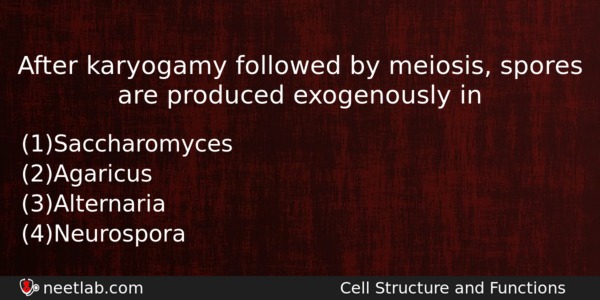| ⇦ | 
| ⇨ |
After karyogamy followed by meiosis, spores are produced exogenously in
Options
(a) Saccharomyces
(b) Agaricus
(c) Alternaria
(d) Neurospora
Correct Answer:
Agaricus
Explanation:
In Agaricus (a genus of basidiomycetes), basidiospores or meiospores are produced exogenously.Neurospora (a genus of ascomycetes) produces ascospores as meiospores but endogenously inside the ascus.).• Alternaria (a genus of deuteromycetes) does not produce sexual spores.• Saccharomyces (Unicellular ascomycetes) produces ascospores, endogenously.
Related Questions: - The different forms of interbreeding species that live in different geographies
- Which one of the following animals has two separate circulatory pathways?
- In the chlorophyta the reserve food of protein surrounded by starch form a
- An example of ex situ conservation is
- The enzyme that increases the reaction rate between CO₂ and H₂O in red blood cells
Topics: Cell Structure and Functions
(413)
Subject: Biology
(4253)
Important MCQs Based on Medical Entrance Examinations To Improve Your NEET Score
- The different forms of interbreeding species that live in different geographies
- Which one of the following animals has two separate circulatory pathways?
- In the chlorophyta the reserve food of protein surrounded by starch form a
- An example of ex situ conservation is
- The enzyme that increases the reaction rate between CO₂ and H₂O in red blood cells
Topics: Cell Structure and Functions (413)
Subject: Biology (4253)
Important MCQs Based on Medical Entrance Examinations To Improve Your NEET Score
18000+ students are using NEETLab to improve their score. What about you?
Solve Previous Year MCQs, Mock Tests, Topicwise Practice Tests, Identify Weak Topics, Formula Flash cards and much more is available in NEETLab Android App to improve your NEET score.
Share this page with your friends

Leave a Reply